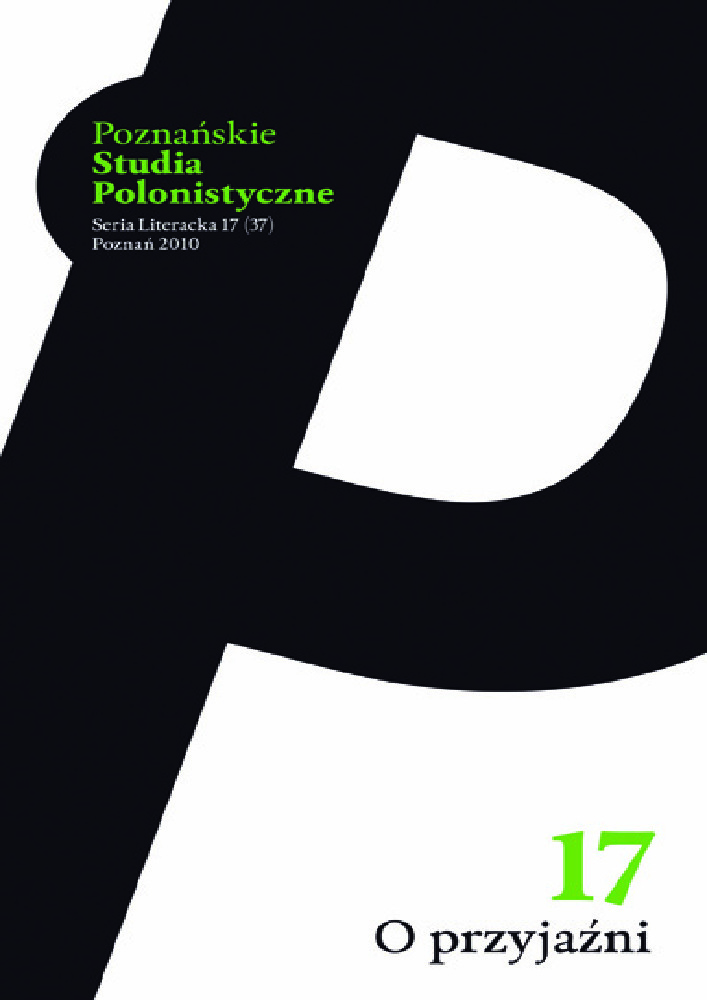Abstract
The following text is the first chapter of Jacques Derrida’s book Politiques de l’amitié [The Politics of Friendship], being the exemplary and standard case of deconstruction, in this particular case, of philosophical texts (Cicero, Plato and, notably, Aristotle). The starting point for the discussion is the performative contradiction inscribed in the wellknown fragment On friendship from Essays by Michel de Montaigne: “O mes amis, il n’y a nul amy” (O my friends, there is no friend). Apparently, everything here is well-known and obvious, even the very notion of friendship, but as we proceed in the argument provided by Derrida, the obvious becomes less obvious to us and takes on new shades and hues in meaning, acquires new values. What is objective mixes in this fascinating argument with what is subjective. What is friendship? What is friendship today? Is friendship limited to just private sphere of interpersonal relations? The answer to the latter question is, according to Derrida, clearly negative. In the course of his argument he states: “There is no democracy without a community of friends”. This argument provides clues to understand a particular archeology of the notion, revealing oblique senses and contexts of the word “friendship”, its
istory shown from the antiquity to the present day.
Funding
Adam Dziadek - tlumaczenie
References
Arystoteles, Etyka Eudemejska, przeł., wstęp, przypisy W. Wróblewski, Warszawa 1997.
Cicéron, Laelius de Amicita, Les Belles Lettres, przekład i opracowanie tekstu R. Combes.
Cyceron M.T., Leliusz o przyjaźni, przeł., oprac., wstęp J. Korpanty, Kraków 1997.
Derrida J., Politiques de l’amitié, Paris 1994.
Etyka Nikomachejska, przeł. D. Gromska, w: Dzieła wszystkie, t. 5, Warszawa 1996.
Leliusz czyli o przyjaźni. Tytusowi Pomponiuszowi Attykowi poświęcony, przeł. E. Rykaczewski, w: M.T. Cyceron, Pisma filozoficzne, cz. 2, Poznań 1879, s. 185–219.
Khatibi A., Dédicace à l’année qui vient, Fata Morgana 1986.
Leliusz o przyjaźni, przeł. W. Kornatowski, w: M.T. Cicero, Pisma filozoficzne, t. 4, Warszawa 1963.
Montaigne M. de, Próby. Księga pierwsza, przeł. T. Żeleński (Boy), oprac., wstęp, komentarz Z. Gierczyński, Warszawa 1985.
Platon, Charmides, Lyzis, przeł., wstęp, objaśnienia W. Witwicki, Warszawa 1991.
Platon, Timaios. Kritias, przeł., wstęp, objaśnienia W. Witwicki, Kęty 2002.
Platon, Uczta, przeł., wstęp, objaśnienia W. Witwicki, Kęty 2008.
Thibaudet A., Gallimard, „Bibliothèque de la Pléiade” 1953.
License
Authors
Authors of texts accepted for publication in „Poznańskie Studia Polonistyczne. Seria Literacka” are required to complete, sign and return to the editor's office the Agreement for granting a royalty-free license to works with a commitment to grant a CC sub-license.
Under the agreement, the authors of texts published in „Poznańskie Studia Polonistyczne. Seria Literacka” grant the Adam Mickiewicz University in Poznań a non-exclusive, royalty-free license and authorize the use of Attribution-NoDerivatives 4.0 International (CC BY-ND 4.0)Creative Commons sub-license.
The authors retain the right to continue the free disposal of the work.
Users
Interested Internet users are entitled to use works published in „Poznańskie Studia Polonistyczne. Seria Literacka” since 2016, for non-commercial purposes only, under the following conditions:
- attribution - obligation to provide, together with the distributed work, information about the authorship, title, source (link to the original work, DOI) and the license itself.
- no derivatives - the work must be preserved in its original form, without the author's consent it is not possible to distribute the modified work, such as translations, publications, etc.
Copyrights are reserved for all texts published before 2016.
Miscellaneous
Adam Mickiewicz University in Poznań retains the right to magazines as a whole (layout, graphic form, title, cover design, logo etc.).
